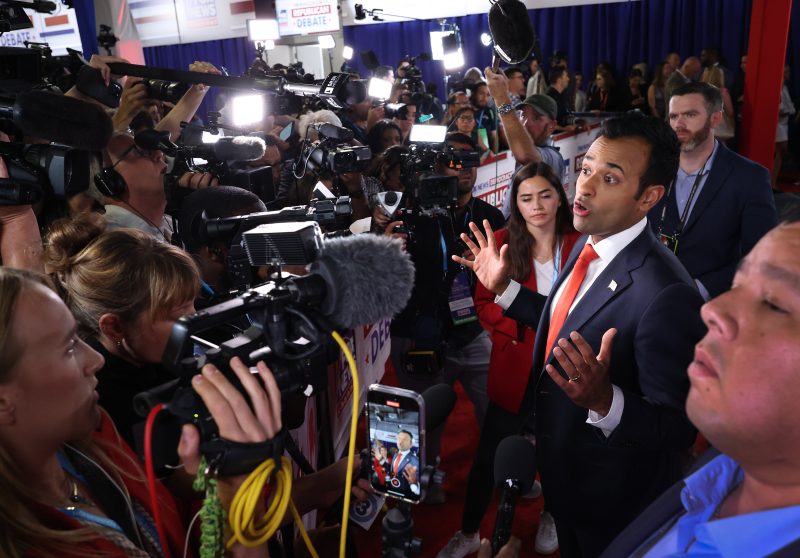Vivek Ramaswamy came into the first debate of the 2024 Republican nominating contest prepared to do what he’s been doing, fairly successfully, for the duration of the campaign to date: pluck popular, often misleading rhetoric from the fringe of right-wing media and internet chatter and present it back to an audience that loves it. On the debate stage, that meant staking out position after position that made more seasoned politicians balk. Like saying climate change was a hoax. Or that he would stop funding for Ukraine’s defense. Or that he would pardon Donald Trump on his first day in office.
This approach, in fact, is one that proved very successful for Trump during his own entry into presidential politics in 2015. Trump, too, was unburdened by the normal constraints of political propriety or awareness; he, too, endorsed fringe positions he’d picked up from right-wing sources.
Ramaswamy’s ploy worked. Analysis of Google search interest — a good proxy for evaluating which debate participants triggered the most curiosity of viewers — indicates that no one saw a consistent level of interest equivalent to Ramaswamy during the debate’s two hours.
Well, except for Trump.
Google’s Trends tool provides a minute-by-minute look at what people are hoping to learn more about. That allows us to compare interest in Ramaswamy with, say, Florida Gov. Ron DeSantis or former New Jersey governor Chris Christie.
What it shows is a number of spikes as comments from candidates spurred viewers to go to Google for more information. The single most searched interest of any minute of the debate came when people jumped on Google late in the second hour, responding to DeSantis’s mentions of his military service by searching for information on exactly that.
Ramaswamy had a number of smaller spikes of his own. Those searches included a perennial debate favorite, asking about the candidate’s age. (Debate searchers also often like to try to figure out candidates’ heights, which is generally harder to answer.)
Notice that while DeSantis had the biggest spike, the level of interest for Ramaswamy was consistently above the baseline — and above the Florida governor. On average, search interest in Ramaswamy landed at 23 over the course of the two hours, measured on a scale of 0 (no searches) to 100 (that high point when people were Googling DeSantis’s military service). The average for DeSantis over the two hours was just over 9 out of 100, slightly higher than the average for former South Carolina governor Nikki Haley. Christie, who landed some of the evening’s firmest blows — often against Ramaswamy — averaged just over 4.
Trump, of course, didn’t participate in the debate. But he was still the focus of a lot of attention. Over those same two hours, minute by minute he averaged 28 out of 100, exceeding Ramaswamy’s average and, in 83 of the 120 minutes, exceeding interest in Ramaswamy.
(The spike in interest in Trump just before 10 p.m. corresponded with Christie criticizing him for suggesting that the Constitution should be suspended.)
Of course, online attention is not always good. Ramaswamy, who’s been surging in the polls, might have drawn the spotlight to himself more than was useful. It’s possible that the attention was, in part, negative.
If the precedent set by Trump is any indicator, though, it very well could work to Ramaswamy’s advantage.

